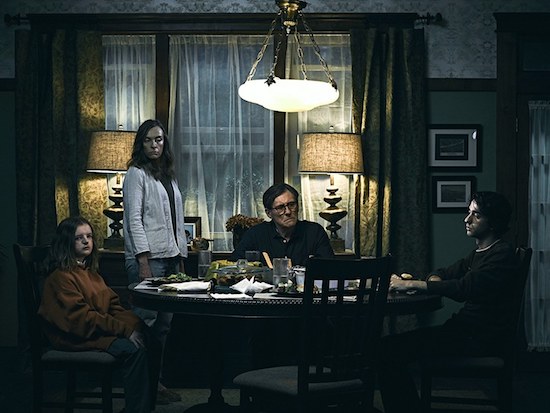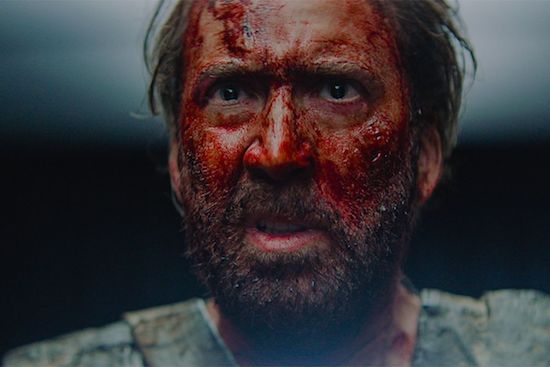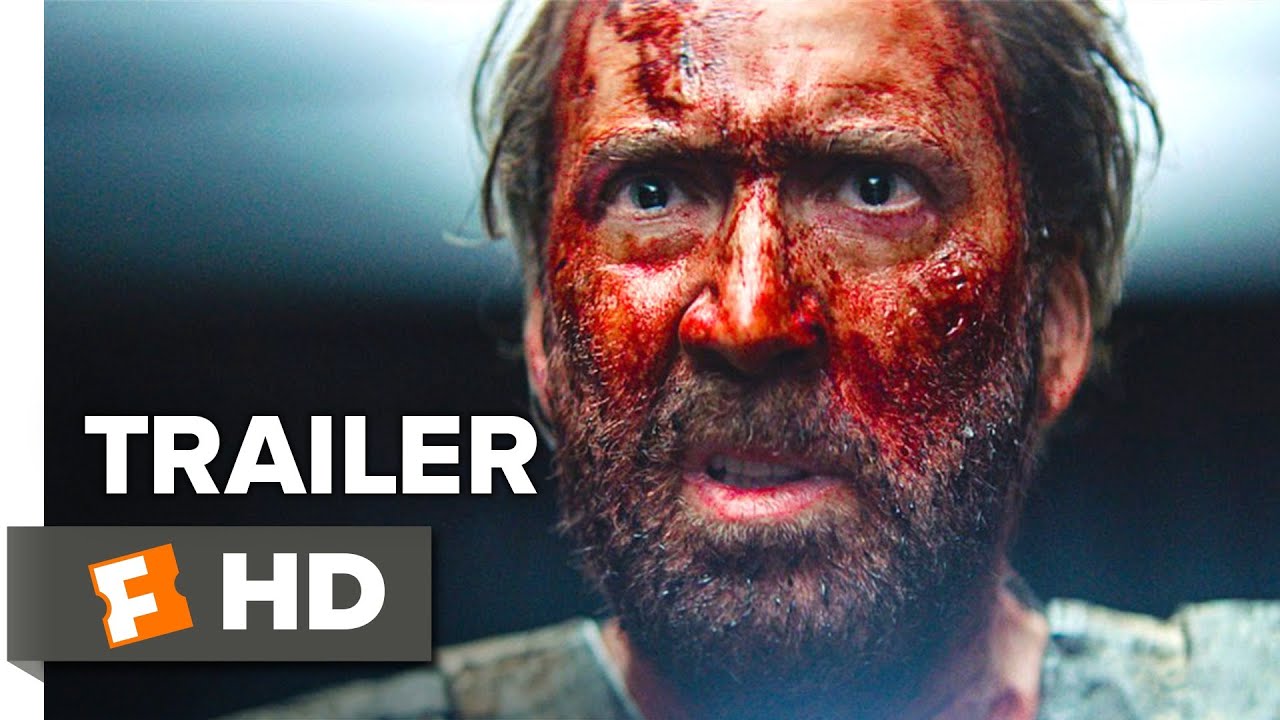It’s undeniable that horror has been in a rude state of health for a number of years now. Audiences have flocked to the cinema to make mega-hits out of films such as Andy Muschietti’s adaptation of the Stephen King novel IT and David Gordon Green’s Halloween sequel/reboot. At the same time streaming services are ensuring that lower-budget work – often by young directors – can reach audiences that they would have passed by only a few years earlier. The general quality of the work has also been extremely encouraging, with sleeper smashes such as The Babadook, or this year’s Hereditary paving the way for critical respectability – for better or worse – and making genre stars out of directors Ari Aster and Jennifer Kent. But even among this slew of quality, 2018 has stood out as a banner year for the genre, throwing up countless films of genuine vision and ambition – often on the smallest of budgets – gifting audiences everything from character driven studies in tension, to gore-flinging yuck-fests, via psychedelic revenge fantasies.
Ask most genre fans to name a best ever year for horror cinema and they’ll reply 1982. A year that bought us films such as John Carpenter’s The Thing, Poltergeist and Dario Argento’s Tenebre as well as a slew of less reputable fare such as Frank Henenlotter’s Basket Case, Larry Cohen’s bizzare and brilliant Q The Winged Serpent and John Piquer Simon’s extraordinarily weird slasher Pieces. But it’s a testament to the best of this year’s output that 2018 can go toe-to-toe with anything from that fright-fecund year and in terms of sheer variety, originality of vision and total brazen what-the-fuckness can easily claim to be at least its equal.
But not all agree. In a recent Vogue article somewhat peevishly entitled ‘Wasn’t This Supposed To Be The Golden Age of Horror?’ writer Taylor Antrim bemoans the state of the year’s crop. Singling out only Hereditary for praise, while denigrating A Quiet Place to the status of "a PG-13 thriller", before appealing straight to the reader: "Did you subject yourself to Winchester? The Nun? Slender Man?"
Well no, Taylor, I didn’t. I subjected myself to Possum, Cold Hell, Ghost Stories, Puppetmaster: The Littlest Reich, MANDY… I could go on and on. The list of movies I made before I started writing this article is extremely unwieldy, and there is no way I could adequately rep for all the horror films that have me convinced of my claim for this year’s dominance. But in terms of originality, stylistic innovation and sheer chutzpah, have no doubt about it, 2018 is going to go down as a golden year for horror cinema.
The rise of streaming services certainly has something to do with horror’s dominance. Netflix gifting young directors with decent budgets and the freedom to realise whatever’s in their heads has this year resulted in both Gareth Evan’s gore-soaked fairytale Apostle, as well as Jeremy Saulnier’s enigmatic and stunningly violent Hold The Dark, as close as the director has ever got to making a ‘straight’ horror film. Specialist streaming service Shudder – or ‘Netflix and Chill’ as some wag has christened it – has become an indispensable resource both for its massive library of films and for providing a spotlight for new talent from around the world. Argentinian writer/director Demian Rugna’s Terrified would deserve all-time status simply for its horrifying first scene, let alone the jangly-nerved rollercoaster that follows and Ryuhei Kitamura’s Downrange mangles bodies and blows brains all over the asphalt with a gleefully sadistic abandon.
Indeed, the more you look at Antrim’s article, the more it becomes clear that he simply hasn’t watched enough horror. And certainly hasn’t looked far outside his local cinema or Netflix queue for inspiration. International films such as Indonesia’s Satan’s Slaves – also currently streaming on Shudder – have provided fascinating foreign twists on genre staples; Paco Plaza’s Madrid-set Veronica made a creaky old possession story line hum with dreadful energy, while Gaspar Noe’s Climax characteristically immolated everything in its sights, resulting in the director of Irreversible‘s most accomplished and pleasing work.

Even on a – slightly – more mainstream level, this year has proved itself to be one of the best. Remakes and reboots have always been a controversial aspect of horror fandom and Gordon Green’s Halloween may have been a disappointment to some – it was certainly a simple tale, with little to differentiate it stylistically from it’s prequel – but Luca Gaudagnino’s Suspiria blew the doors off anything people expected from a reworking of a hallowed classic. Jettisoning original director Dario Argento’s psychedelic visual flourishes and knuckling down to a story dripping with dread, melancholy and unafraid to tackle some big ideas about guilt and the past’s inability to let us go.
But 2018 has also delivered big on the less respectable end of the genre: the brain-pulping face-shredders that horror fans pack into festivals to enjoy with like-minded lovers of the debased and prurient. Puppetmaster: The Littlest Reich made no bones about going for the title of ‘most offensive movie ever made’ with some genuinely… err, inventive methods of dispatch unveiled, while the way-more-entertaining-than-it-should-be Purge series continued in its trail of lib-sploitation with The First Purge before branching out into a TV series on Amazon Prime. Any year that gave us Sean Black’s agreeably pulpy Predator, Leigh Whannell’s hilariously violent Upgrade, and even managed to deliver a half-decent – and totally disgusting – Hellraiser sequel is one that’ll always make a certain segment of the horror community happy.
But one of the most convincing effects of this year’s run of quality has been horror’s creeping influence on films on the fringes of the genre. Westerns, crime and even martial arts films have harnessed aspects of horror and run with them in deliriously inventive ways. Witness Timo Tjahjanto’s Indonesian bone-cruncher The Night Comes For Us – currently streaming on Netflix – for a staggeringly violent crime drama that owes as much to Sam Raimi’s splatter-tastic Evil Dead series as it does to any more conventional brawler. Helene Cattet and Bruno Forzani moved away from the Giallo worship of previous films, Amer and The Strange Colour Of Your Body’s Tears, to deliver the stunningly beautiful western/crime drama Let The Corpses Tan, providing some of the year’s most indelible imagery in the process. While Ted Geoghegan’s Mohawk took aspects of the titular tribe’s mythology and fashioned a grand old-fashioned – yet raw and contemporary – adventure story.
In terms of the small screen – whatever that means in the days of streaming content – Netflix’s binge model gave us Mike Flanagan’s serialisation of Shirley Jackson’s the Haunting Of Hill House. By no means perfect – ten hours is a lot of time to be trapped with such miserable characters – it provided a series of extremely effective scares and a palpable sense of murky dread. More convincing was AMC’s adaptation of Dan Simmon’s massive and memorably bonkers novel The Terror, which pitted a superb cast (including Ciaran Hinds, Tobias Menzies and Jared Harris) against the harsh climate of the Arctic, Inuit magic and a giant man-devouring polar bear. It’s chilling evocation of location and desperate sense of impending madness coming together to create one of the best and most affecting televised horror experiences of all time.
But what has really made the year stand out is the unabashedly visionary and personal nature of a lot of it’s films. Yes, MANDY gave us a career-best performance from Nicolas Cage, as well as the unforgettable sight of the macaroni-barfing Cheddar Goblin, but what made Panos Cosmatos’ masterpiece really stand out was it’s complete commitment to doing things it’s own way. MANDY could not have been made by any other director, full-stop; a cataloguing of one man’s obsessions grafted to a heart-wrenching story about love and loss. Similarly Matthew Holness’ Possum is a work of singular bleak intensity. It’s oblique narrative framework and teeth-itchingly creepy visual style suggesting a version of Kes re-written by Thomas Ligotti. It’s terrifyingly committed central performance by Sean Harris will surely go down amongst the year’s best, alongside Toni Collete’s surely-to-be-Oscar-nominated evocation of the devastating horror of loss in the similarly singular Hereditary.
And there’s no sign of it stopping! The still-to-watch list is ever growing. In the daft-pulpy-fun corner there’s Julius Avery’s Overlord, while Indian language fantasy/horror crossover Tumbbad looks to be a scream. Shudder is currently streaming Andy Mitton’s The Witch In The Window and I can’t believe I haven’t got round to watching Martyrs director Pascal Laugier’s Incident In A Ghostland yet. The sheer rate at which interesting and original films are appearing means that I’ll probably still be catching up when next year rolls around. A year which promises Us – Jordan Peele’s much-anticipated follow up to the Oscar winning Get Out, a Pet Sematary remake, sci-fi/horror crossover Captive State and supernatural chiller The Curse Of La Llorona is one that’s sure to provide even jaded genre fans with plenty to talk about. Indeed, the only thing stopping me from definitely stating that 2018 is the best year for horror cinema ever is the not-at-all unlikely chance of next year being even better.



